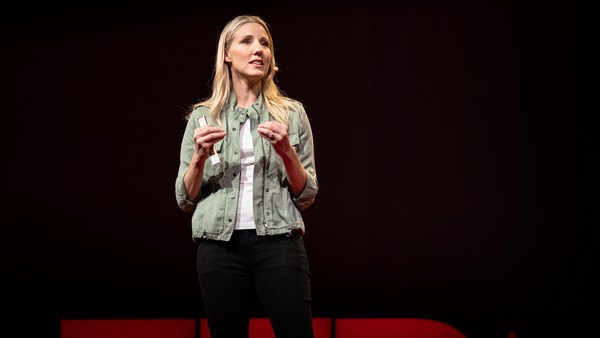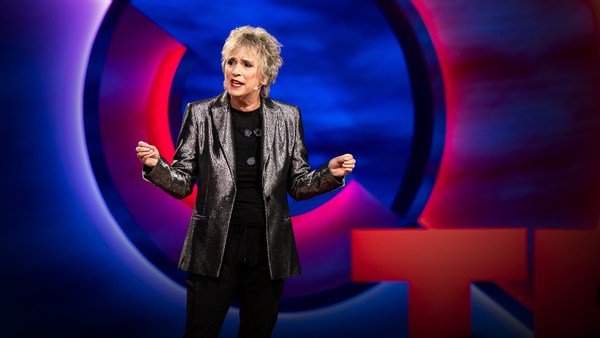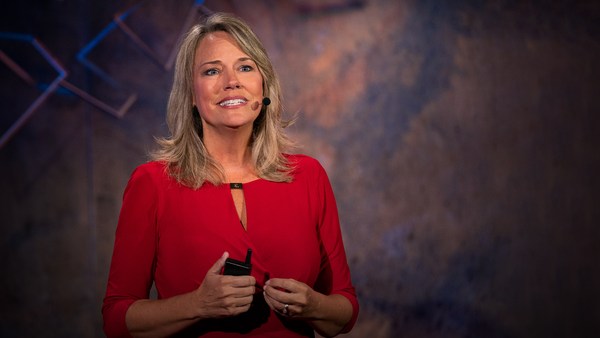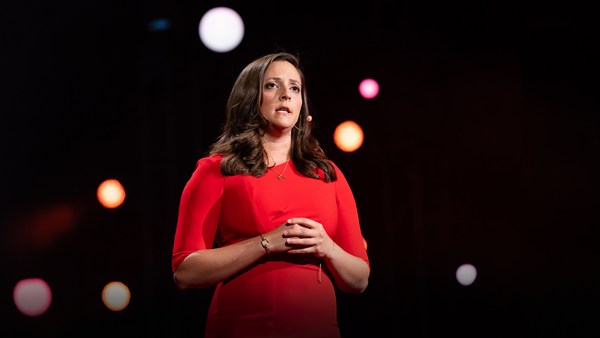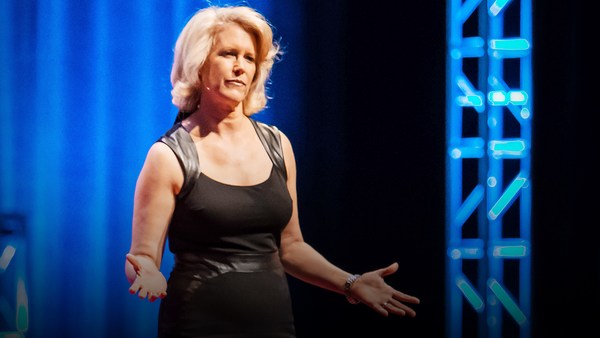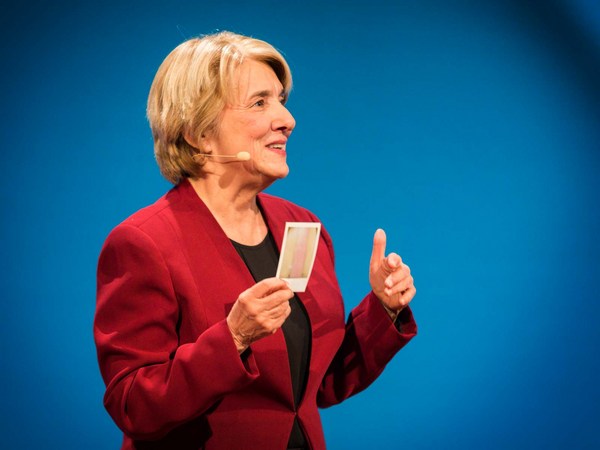A few weeks ago, I sat down with my mother and told her something that I had been keeping from her for 22 years. From the time that I was 14 years old until I was 16, I was sexually assaulted. It was scary and confusing. It was humiliating. And even though I can genuinely say that my mom and I have always had a close relationship, I never told her. Even with recent movements bringing the topics of sexual abuse and sexual assault into mainstream conversation, I stayed silent. And I guarantee that for every brave soul who said "Me too," there were countless others who didn't ... who still haven't. Why didn't those people speak up earlier? Why didn't I? Because of the shame. Because of that feeling inside telling me that what happened to me was my fault.
We all hear that voice sometimes. It tells us things like, you are aren't good enough, you aren't smart enough ... you can't give a TED talk. We hear that voice, and it becomes difficult to hear anything else. We begin to agonize over what other people will think of us -- how they will judge us if they found out our darkest secrets. Shame is so powerful that it can become part of who we are.
I told my mom what happened to me and one of the first things that she said was, "Oh, Kristin, I've been wondering what's been driving you so hard all of these years." She could see it before I could. My shame was so deep-rooted that I had overcompensated by trying to be perfect in every other area of my life. Trying to build the perfect family, the perfect career, by trying to exhibit control instead of the chaos I felt inside. I have been trying my entire life to orchestrate how the world perceives me, because inside I haven't felt good enough. She always said that I burned the candle at both ends, and now she knew why.
Some people may be more prone to shame than others, but sexual abuse doesn't discriminate. It has the ability to make even the most confident of us think painful, negative thoughts. Why? Because it takes away control over the one thing in this life that is supposed to be truly and entirely our own: our bodies.
I've been haunted by one thought since my experience first began. As I tried to make sense of what happened to me, I thought to myself: this is all my fault. I didn't say "no" good enough. Next time, I'll say "no" better. I've questioned why that was my go-to response and why my shame was so deep and heavy that it paralyzed me from speaking my truth for so long. And now that I'm the parent of two amazing children, I constantly wonder what I can do and what we can all do as a society to get ahead of the shame and instead empower our children to know without a doubt that sexual abuse isn't their fault.
Dr. Brené Brown, who has done incredible research around shame and vulnerability, calls shame the most powerful master emotion. And I couldn't agree more. Shame has the power to make kids who have been sexually assaulted or in some other way victimized by adults turn in on themselves and experience intense internal pain.
But think about that. Isn't that incredibly unfair? Haven't we failed as a society when the end result is a child feeling shame? Shouldn't it be the perpetrators? Shouldn't they be ashamed of what they've done? Instead, they prey on the shame of children and manipulate them into thinking that what happened is their fault. The person who violated me fed my shame and I played right into it, becoming a knot of tortured silence for many years.
But is that shame also my fault? Not as a victim but as a parent, who like so many of us, has unthinkingly said things to my children like, "Don't let anyone touch you; don't let anyone hurt you; don't put yourself in situations where you can become a victim." As parents, we believe that we're empowering our children to take ownership of their bodies, but when we say "don't let anyone touch you," what we're really saying is "you are responsible for the actions of somebody else." We're treating this subject like it's something children can control, which is unrealistic, and are in turn creating a sense of false responsibility in the mind of a child. An internal narrative that tells them it is their job to stop bad things from happening, that they as children are responsible for stopping the actions of someone who is usually bigger, stronger and older than they are. I heard a message that I should have been able to stop what was happening to me and that made me blame myself. I developed and then believed the idea that I had done something wrong.
I constantly wonder if I'm unintentionally setting the same traps for my children. I'm not wrong for wanting to keep my kids safe, but I might be wrong for inadvertently telling them the same sorts of things that I believed as a child -- that I could prevent someone from taking advantage of me by saying "no," and therefore, if my "no" didn't work, that it was my fault. As a survivor, I want to tell them now what I longed to hear then: that there is nothing you can do to prevent yourself from being taken advantage of by someone who should know better.
But at the same time, I want them to believe they have the power to stop someone from taking advantage of them. I want them to feel ownership of their bodies. I want to tell my kids that I can protect them, and I want to believe that. But buried beneath all those good intentions and motherly instincts is that same shame. If I tell my kids that there's something they can do to prevent sexual assault, doesn't that mean that there's something that I could have done?
We teach our children to say "no". I said "no" every time. And I quickly learned that "no" doesn't always work. That doesn't mean that saying "no" is the wrong idea, just that it's not a solution. This is a scary concept to talk about, but it's a reality that we have to face and be honest about with our children. The more that I said "no," the more I prolonged the inevitable. It got to the point where I felt that if I just gave in and got it over with, at least I would have some peace until whenever the next time would be. That made me feel like a failure. I felt all sense of power I had over the situation slip away, and any grand illusions of fixing what had happened only compounded the guilt and shame that I felt for not being strong enough to stop my abuse. Now I felt guilty for being weak. I felt guilty for being scared. I was supposed to be stronger. I was supposed to say "no" better. My "no" was supposed to be enough.
Now instead, I try to tell my kids that if something bad happens to them, it's not because they didn't prevent it nor is it on their shoulders alone to say "no." Although it feels like it, sexual assault doesn't occur in a vacuum. It is enabled every single day by how our society misrepresents and conditions us to think about sexual violence: the gender norms and systemic misogyny that are ever-present, the victimization of victims and so much more. It is not just an individual problem, especially when some studies show that as many as one in four girls and one in 13 boys experience sexual abuse at some point during childhood. And that means it's not just on individuals to solve it.
So of course while I try to teach my kids about strength and resilience and persevering, and overcoming obstacles, I make sure that they know strength doesn't mean facing challenges or dark feelings alone. In fact, there's strength in numbers and strength in asking for help.
I was ashamed to speak up for fear of appearing weak, but what I learned is talking about what happened to me only made me stronger. It made my shame start to dissipate. I teach my kids about courage, and I want them to know that courageous, strong people ask for help.
I remember when I was little, my parents would walk me to the bus stop. They said it was to keep my safe, and I believed that. I remember always looking out for that white van that I had been warned about. But like over 90 percent of children who are sexually abused, I wasn't taken off a street corner or abducted from a shopping mall. I was violated by someone I knew.
My parents did everything they could to protect me, but what none of us realized was the foundation of shame that was building inside when we talked about "stranger danger" and saying "no" and not becoming a victim. Of course this wasn't intentional. They did what all of us want to do as parents ... imagine that there's something we can do to protect our children from bad things, but the fact is we can't. And we can't solve the problem of sexual assault by shifting all of the blame onto victims or potential victims or even our loved ones. The blame, 100 percent, is with the perpetrators. And pretending that it lies anywhere else not only allows those who commit assault to escape full responsibility but also perpetuates shame for victims. And I for one am tired of being ashamed.
I'll be honest with you. I wrote at least 10 different conclusions to this talk, but none of them felt right. And I think that's because there isn't a conclusion here. There's no way to wrap this subject up in a box, tie it in a perfect bow, set it aside and call it done. This requires ongoing, open and sometimes uncomfortable conversations. And as much as I want to protect my children now, what I've come to realize is I can't protect them from sexual violence any more than my parents could have protected me. But what I can protect them from is shame.
God forbid my children go through what I went through. I, at the very least, want them to know that sexual assault is not, never was and never will be their fault.
Thank you.
